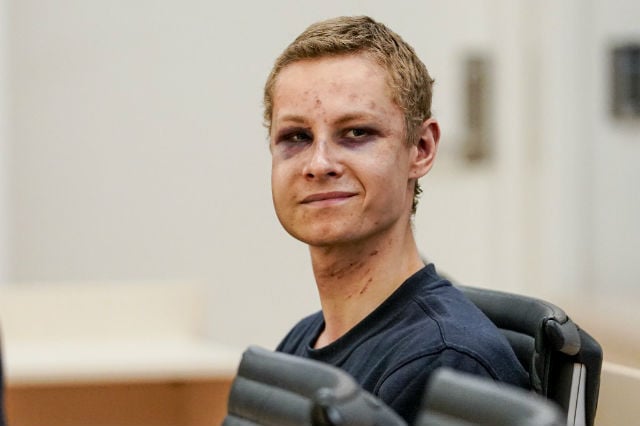On Tuesday, the first day of his testifying, Breivik told a court trying him for the murder of 77 people that he acted to defend ethnic Norwegians from the threat of rising multiculturalism.
"People who call me evil have misunderstood the difference between evil and brutal," he said, adding that the decision to drop the bombs on Japan was, like his carnage, also made with "good intentions."
The 33-year-old also drew parallels to Native American tribal chiefs Sitting Bull and Crazy Horse, saying they were examples of those who fought for their people. "Were they terrorists … or heros?," he asked.
Speaking in a calm and composed voice as he presented his Islamophobic and anti-immigration ideology, Breivik described Oslo as a "multicultural hell".
"Christians today are a persecuted minority," he said, while claiming that "rivers of blood caused by Muslims" are now flowing in European cities, citing Madrid, London and Toulouse, the sites of Islamist extremist attacks.
Judge Wenche Elizabeth Arntzen repeatedly asked him to quickly wrap up his statement after he exceeded his allotted 30 minutes.
The gunman had received permission to address the court from a prepared text, which he said he had already scaled back and toned down, but which he described as necessary to present the framework of his case and counter "the lying propaganda" presented by media.
He said he had toned down his rhetoric out of consideration for the survivors and families of the victims, but the judge several times reminded him of his pledge.
A lawyer for survivors and family members of his victims objected at one point, telling the court many objected to this methodical presentation of what Breivik termed "the facts".
Television and radio were banned from broadcasting his words live amid concern he would seek to use his court appearance to preach his ideology.
"Multiculturalism is a self-destructive ideology," Breivik claimed, expressing disdain for Norway's generous immigration policy which he said would soon make ethnic Norwegians a minority in their own country.
"All that will be left is sushi and flat screens," he said.
He often used the pronoun "we" in his speech, giving the impression he was a member of a larger group, and frequently cited statistics and studies.
"We do not accept .. that we are made into a minority in our own country," he said.
Insisting that his attacks were "preventive", he asked to be acquitted.
But at the same time he said he was not afraid of being sent to prison, saying it would be "the biggest honour".
"I was born into a prison," where the multicultural elite were conducting "indoctrination" in schools to maintain their "hateful" and "evil" ideology.
"In this prison you are not allowed to protest … This prison is called Norway," he told the court.
He claimed that multiculturalists had all the power and there was no room for "militant nationalists" like himself to air their views peacefully.
"When peaceful revolution is made impossible, the only option is violent revolution," he claimed.
The man who grew up in the poshest part of the Norwegian capital told the court: "I was born and raised in a conflict zone," insisting that parts of Oslo had become "no-go zones for anyone but Muslims.
"Aggressive cultures .. like Islam will grow .. as aggressively as cancer," he told the court.
On July 22nd, Breivik first killed eight people when he set off a bomb in a van parked in central Oslo before heading to Utøya island where, dressed as a police officer, he spent more than an hour methodically shooting at hundreds of people attending a ruling Labour Party youth summer camp, killing a further 69.
He said it had been necessary for him to attack the Labour Party and its youth wing to change the party's multicultural policies and hopefully ward off full-out war.
He compared the Labour Party's youth wing AUF to Hitler Youth, saying he targetted them on the island of Utøya because "most AUFs are naive and indoctrinated."
"These were not innocent children, but political activists," Breivik argued, as survivors and relatives of the victims shook their heads in disbelief and grew impatient for him to finish.
Breivik described his attacks as "the most spectacular operation conducted by a militant nationalist this century."
"Everything is turned on its head — Norwegian media … has decided that the good are the evil and the evil are the good," he lamented.


 Please whitelist us to continue reading.
Please whitelist us to continue reading.
Member comments